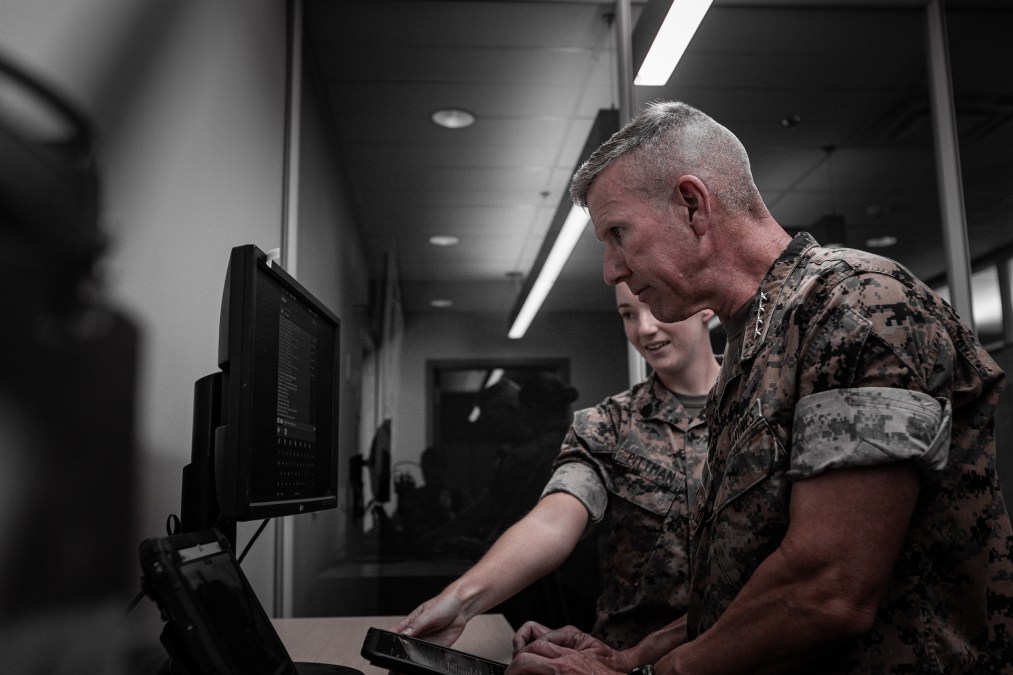Marine commandant wants ‘off-the-shelf’ generative AI tools for the Corps

The Marines are gearing up to integrate more generative artificial intelligence tools into the force, but the service’s top officer doesn’t want to have to spend a lot of money to develop them.
The Corps, like the Defense Department writ large, is keen on tapping into emerging genAI capabilities for various military purposes.
Last month, Lt. Gen. Melvin “Jerry” Carter, the deputy commandant for information, issued new guidance on the technology, writing that these types of tools present “unique and exciting opportunities” for the Marines. Such genAI models can use input data to create new content such as images, videos, audio, and text.
“These advanced AI algorithms possess the remarkable ability to provide humanlike responses to user prompts, leveraging the vast datasets on which they were trained,” Carter noted.
“These systems have the potential to revolutionize mission processes by enhancing operational speed and efficiency, improving decisionmaking accuracy, reducing human involvement in redundant, tedious, and dangerous tasks, and enabling real-time adaptability to dynamic operational environments. This technological advancement can significantly boost mission effectiveness and operational readiness, providing a strategic edge in modern warfare. Commanders and senior leaders should advocate for the use of GenAI tools for their appropriate use cases,” he wrote.
Commands will be expected to establish AI task forces or cells consisting of data, knowledge management, artificial intelligence and digital ops experts to assess the applicability of existing and in-development offerings and produce a list of “forthcoming preferred GenAI capabilities,” he noted.
Commandant Gen. Eric Smith told DefenseScoop at a Defense Writers Group meeting Wednesday that he doesn’t anticipate the need for a major organizational shakeup for the Corps as it looks to integrate new artificial intelligence capabilities. And he’s not looking to invest a lot of money into building bespoke platforms for Marines.
“We’re not going to reorganize based on AI. We are going to use the tools that are available, and we use the Marine Corps Warfighting Lab, along with deputy commandant for information … to make sure that what is out there is utilized by us so that what I don’t want to do is I don’t want to pay the S&T costs, I don’t want to pay the R&D costs. I just want to take off-the-shelf technology and have my Marines use it because the off-the-shelf technology is better than anything that I could come up with. I mean, it’s not a matter of the DOD having to lead this effort. I mean, it’s a matter of being a fast follower,” Smith said.
DOD officials and others have voiced concerns about the technology, including so-called “hallucinations” where genAI models produce inaccurate, misleading or biased results that could create problems for the humans who are trying to leverage them.
Smith noted that there needs to be an effective and continuous testing and evaluation methodology to ensure the output of the algorithms meets “reasonable expectations.”
Data privacy and security are also top of mind for DOD officials looking to bring these cutting-edge capabilities into the Pentagon and field them to military units. The department doesn’t want its sensitive data leaking out into the public domain or where adversaries can find it.
The commandant of the Corps expressed confidence that the Marines — especially the younger cohorts — will embrace genAI effectively and figure out the best use cases.
“I don’t have any concerns about integrating it into the force,” Smith told DefenseScoop at the Defense Writers Group meeting. “My Marines are digital natives. I mean, they grew up with an iPhone 14 in their hands. You know, I grew up with a cord. So the young Marines will figure out how to use that and they’re the ones that are telling us how to do it. They’re completely comfortable with generative AI, with machine-to-machine learning. They’re completely comfortable with using a pad and doing targeting off a pad and passing that targeting data ubiquitously across the force through a sensor cloud and then down to another user through GEO satellites. They’re completely comfortable with that, so I don’t have any concerns about that other than the security of our communications links.”
He noted that he recently spoke with leaders and Marines at U.S. Cyber Command about these types of security issues.
“I have concerns about our security layers, but they [and] we have to operate. You know, you can’t be so defensive that you can’t use your systems,” Smith said.






